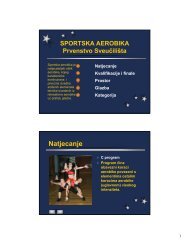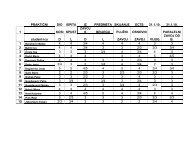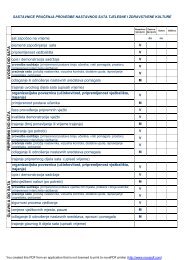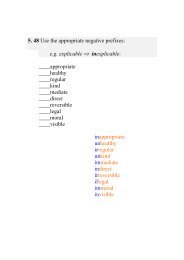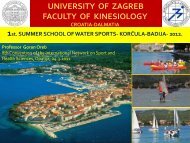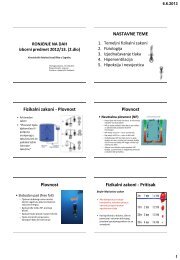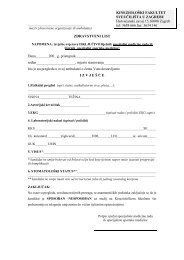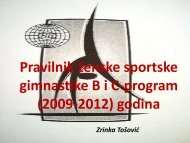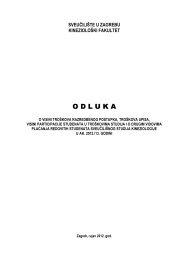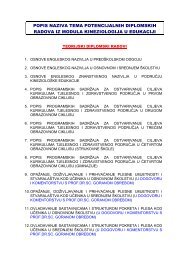Research Methodology of Kinesiology
Research Methodology of Kinesiology
Research Methodology of Kinesiology
You also want an ePaper? Increase the reach of your titles
YUMPU automatically turns print PDFs into web optimized ePapers that Google loves.
No. Title <strong>of</strong> the subject: <strong>Research</strong> <strong>Methodology</strong> <strong>of</strong> <strong>Kinesiology</strong><br />
1. Module / Subject leader Full pr<strong>of</strong>essor Franjo Prot, PhD<br />
2. University teachers and instructors Full pr<strong>of</strong>essor Franjo Prot, PhD<br />
Assistant pr<strong>of</strong>essor Goran Sporiš, PhD<br />
3. Contact hours 60<br />
4. Contact hours – seminars and 30<br />
practical work<br />
5. Number <strong>of</strong> hours necessary for<br />
student individual work (seminar<br />
papers, essays, projects, etc.)<br />
15<br />
6. Number <strong>of</strong> hours necessary for<br />
student preparation for the<br />
examination<br />
7. Number <strong>of</strong> hours necessary for other<br />
forms <strong>of</strong> work (if planned)<br />
72<br />
15<br />
8. Total number <strong>of</strong> hours necessary for 162<br />
completion <strong>of</strong> the subject taught<br />
9. Illustrative contents Scientific foundation <strong>of</strong> researching sport, phyisical education and<br />
exercise science. Exercise and training as kinesiological transformational<br />
process. Diagnostic, prognostics and explanatory operations.<br />
Methodological fundamentals <strong>of</strong> research in kinesiology. Methodological<br />
principles and the purposefulness <strong>of</strong> research.<br />
Independence, interdisciplinarity, transdisciplinarity and the topic <strong>of</strong><br />
research in kinesiology. Education, qualification and organizational forms<br />
<strong>of</strong> work in domains <strong>of</strong> kinesiology.<br />
Types <strong>of</strong> research: fundamental and applied. Topics <strong>of</strong> scientific research<br />
and their position with regard to the structure <strong>of</strong> kinesiology, the<br />
relationship between kinesiology and other sciences. Methods <strong>of</strong><br />
research in kinesiology. Hypotheses generating methods. Data collection<br />
methods. Data analysis methods. Interpretation <strong>of</strong> results.<br />
Sampling criteria. Kinesiometric equivalents <strong>of</strong> kinesiological<br />
manifestations. The analysis <strong>of</strong> the latent structure <strong>of</strong> manifest variables<br />
in kinesiology and cognate disciplines. Correlational, regressional and<br />
canonical approach to the relations between the sets <strong>of</strong> variables.<br />
Identification <strong>of</strong> differences between typical groups <strong>of</strong> kinesiological<br />
subjects. Taxonomic approach to kinesiological phenomena. The analysis<br />
<strong>of</strong> quantitative changes. The analysis <strong>of</strong> qualitative changes.<br />
Reporting. Presentation and publication <strong>of</strong> research results (written, oral,<br />
multimedia). Structuring <strong>of</strong> scientific and pr<strong>of</strong>essional works. Individual<br />
and team work, authorship and patents.<br />
Types <strong>of</strong> graduation thesis. The procedure and the criteria for submission<br />
<strong>of</strong> requests for the endorsement <strong>of</strong> the topic <strong>of</strong> the graduation thesis.<br />
Elaboration and realization <strong>of</strong> the graduation thesis project submission.<br />
10. Learning outcomes (general and<br />
specific competences, knowledge<br />
and skills acquired)<br />
The students will get an insight into the possible approaches, the latest<br />
results and the appropriate research methodology that enables the<br />
understanding <strong>of</strong> results <strong>of</strong> scientific and pr<strong>of</strong>essional work in kinesiology.<br />
They will be able to choose the appropriate approach when selecting the<br />
area <strong>of</strong> research, the appropriate topics and the corresponding<br />
methodology <strong>of</strong> outlining simpler research studies in kinesiology.<br />
11. Learning and teaching methods Lectures and seminars.<br />
12. Other student duties (if planned) Participation at conferences and symposia.<br />
13. Evaluation <strong>of</strong> student academic<br />
progress, or type <strong>of</strong> the examination<br />
Oral examination. (The written examination is also possible.)<br />
14. Compulsory reading list 1. Thomas, J.R., Nelson J.K. and Silverman S. (2005). <strong>Research</strong> methods in<br />
physical activity. 5 th edition. Champaign IL: Human Kinetics Publishers, Inc.<br />
ISBN-13: 978-0736056205
2. Thomas, J.R., Nelson J.K. and Silverman S. (2010). <strong>Research</strong> methods in<br />
physical activity. 6 th edition. Champaign IL: Human Kinetics Publishers, Inc.<br />
ISBN-13: 978-0736056205<br />
3. Berg J.R., Latin R.W. (2004). Essentials <strong>of</strong> <strong>Research</strong> methods in Health,<br />
Physical education, Exercise Science and Recreation. activity. 3 rd edition.<br />
Lippincott Williams & Wilkins ISBN-13: 978-0781770361<br />
15. Optional reading list 1. Gratton, C. and I. Johnes, (2010). <strong>Research</strong> methods in sport studies. 2 nd<br />
edition. Abingdon UK: Routledge ISBN-13: 978-0415493932<br />
2. Sparks, A. C. (Ed.) (1992). <strong>Research</strong> in physical education and sport -<br />
Exploring alternative visions. The Elmer Press, London, Washington D.C.<br />
16. ECTS credit rating 5<br />
17. Explanation <strong>of</strong> the ECTS credit<br />
rating<br />
18. Assessment <strong>of</strong> teaching quality and<br />
effectiveness<br />
The number <strong>of</strong> ECTS credits equals the number <strong>of</strong> hours necessary to<br />
meet the demands <strong>of</strong> the subject taught and to prepare for the<br />
examination.<br />
Keeping the record <strong>of</strong> student efficiency in examination. Anonymous<br />
questionnaire filled in by the students.


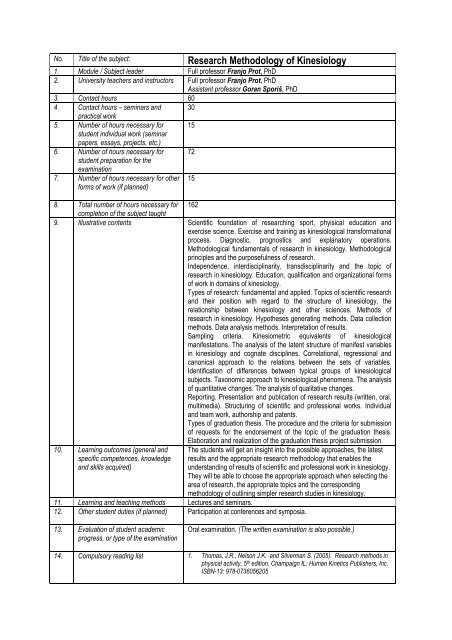
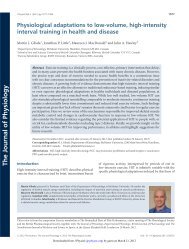

![NASTAVNI_PLAN_I_PROGRAM-_integrirani_studij [2,09 MiB]](https://img.yumpu.com/23830973/1/184x260/nastavni-plan-i-program-integrirani-studij-209-mib.jpg?quality=85)
